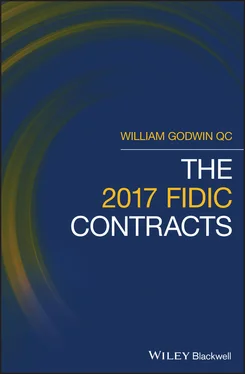One of the complaints contractors make about the 1999 Books is that, in the event of the Employer's terminating the Contract for his own convenience, that is, in the absence of any fault on the part of the Contractor, the Contractor is not entitled to any loss of profit suffered as a result. Instead, clause 15.5 gives the Contractor no more than he would be entitled to where there has been a termination by reason of force majeure.
This was thought to be anomalous and the position has been corrected in the 2017 Books. The Employer now faces the prospect of having to compensate the Contractor for loss of profit or other loss or damage suffered as a result of a termination for convenience under a new clause 15.6. 14
There is also an important provision entitling the Contractor to loss of profit where work has been omitted from the Contract scope in order to be carried out by the Employer or others. In the 1999 contracts there was a blanket prohibition against the Employer's instructing the Contractor to omit work in order for it to be carried out by others (clause 13.1). This has been modified in the 2017 editions by permitting work to be omitted which is to be carried out by the Employer or others but (unless there has been a failure to remedy defects and clause 11.4 applies) 15 only where the Contractor agrees to this (clause 13.1). In that case, however, the Contractor can include in his proposal for an adjustment to the Contract Price under clause 13.3.1 any loss of profit and other loss or damage suffered or to be suffered by him as a result of such an omission (clause 13.3.1(c)). 16
Change in laws
Another important new risk for the Employer in the 2017 forms is that the scope for claiming additional time and/or money as a result of changes in the laws and regulations affecting the project has been significantly increased in a new clause 13.6. 17 In the 1999 editions the Contractor can claim time and/or money where the laws of the country where the project is situated or the judicial or official interpretation of them, after the Base Date, gives rise to delay and/or additional cost (clause 13.7). The new clause 13.6 adds to this by providing for changes made or published after the Base Date in:
(a)any permit, permission, licence or approval obtained by the Employer or Contractor according to their respective obligations under clause 1.13 (Red and Yellow Books)/1.12 (Silver Book); or
(b)the requirements for any permit, permission, licence and/or approval to be obtained by the Contractor under clause 1.13(b)/1.12(b)
to entitle the Contractor to claim an extension of time and/or additional payment for any delay caused and/or cost incurred as a result.
This additional risk to the Employer is counterbalanced, however, by a new provision in clause 13.6 that provides for the Employer to be entitled to claim a reduction in the Contract Price should a change in the laws, including the above changes in or requirements for permits, permissions, licences and/or approvals, result in a decrease rather than an increase in cost.
1.5 FIDIC's Guidance for the Preparation of Particular Conditions
As mentioned in Section 1.1above, the Particular Conditions in the 2017 contracts comprise (a) the Contract Data and (b) the Special Provisions. The 1999 contracts also provide for Particular Conditions but do not divide them up into these two categories; instead, the relevant details are included more generally. The division of the Particular Conditions into Contract Data and Special Provisions was introduced in the 2008 Gold Book for greater clarity, and has been adopted accordingly in the 2017 editions. Together with the general conditions, the Contract Data and Special Provisions comprise the conditions of contract for each of the 2017 Books.
An example of the Contract Data is given at the back of each of the 2017 forms in the section headed ‘Guidance for the Preparation of Particular Conditions’. As the brief notes accompanying the example explain, the Contract Data identify the specific information needed to be provided before the documents forming the Contract are complete and in order to avoid the default provisions to be found in some of the clauses of the general conditions taking effect. Thus the Contract Data, which are to be completed by the Employer in preparing the tender documents, set out each of the sub‐clauses of the general conditions which require such specific further information. So, for example, clause 1.1.20 defines ‘Cost Plus Profit’ to mean Cost plus the applicable percentage for profit stated in the Contract Data or, if not so stated, 5%; the first item in the Contract Data example sheet then refers to clause 1.1.20 and leaves a space to be completed by the Employer for identifying the specific percentage profit to be added to Cost. The Employer will ensure that this item is completed if he wishes to avoid the default 5% applying. Similarly, the second item in the Contract Data refers to clause 1.1.27, which requires the Defects Notification Period which is to apply to the Contract to be stated, failing which the default one‐year period will apply. Other Contract Data items include the time for completion, the governing law, the ruling language and a host of other important specific details which need to be addressed.
1.5.2 The Special Provisions
The Special Provisions enable the parties to amend the general conditions. Amendments of one kind or another are inevitable in any contract in order to meet the specific needs of the project. As FIDIC points out in its Guidance, local legal requirements may necessitate modifications to the general conditions, particularly if they are to be used on domestic contracts. Where any amendments are made to the general conditions great care needs to be taken to ensure both that the amendments are internally consistent and that they are consistent with the unamended general conditions; confusion and disputes are otherwise likely to arise.
As FIDIC points out in the Guidance, the Special Provisions have priority over the general conditions, with the Contract Data having priority over the Special Provisions. This is consistent with clause 1.5 of the general conditions, which sets out the priority of documents forming the contract in the event of any conflict, ambiguity or discrepancy between them.
As part of its Guidance FIDIC urges the parties to have regard to certain ‘Golden Principles’ when drafting Special Provisions. These Golden Principles are intended to ensure that amendments to the general conditions be limited to those necessary for the particular features of the project and compliance with applicable law; in the case of the Red and Yellow Books, do not change the essential fair and balanced character of the FIDIC Contract; and that the Contract remain recognisably a FIDIC Contract. There are five such Principles set out in the Guidance, some of which might be easier to follow in practice than others. For example, General Principle 1 is that the duties, rights, obligations, roles and responsibilities of all the Contract participants must be generally as implied in the general conditions and appropriate to the requirements of the project; however, it might not be very obvious how this is to be applied in practice, or even whether it ought to be attempted to be applied in a particular project. General Principle 2, on the other hand, which is that the Particular Conditions must be drafted clearly and unambiguously, is certainly salutary general advice.
The FIDIC Guidance provides useful notes on the preparation of tender documents. These notes develop the notes which also appear at the back of the 1999 editions.
Читать дальше












